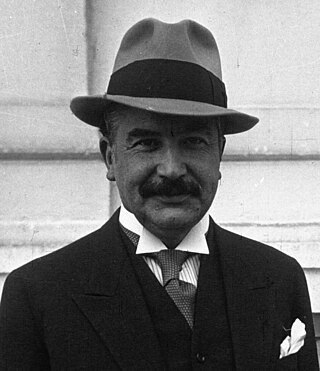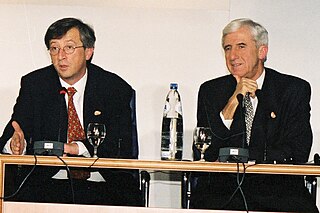Related Research Articles
Luxembourg is a parliamentary representative democratic monarchy, whereby the prime minister is the head of government, and the multi-party system. Executive power is under the constitution of 1868, as amended, exercised by the government, by the grand duke and the Council of Government (cabinet), which consists of a prime minister and several other ministers. Usually, the prime minister is the leader of the political party or coalition of parties having the most seats in parliament. Legislative power is vested in both the government and parliament. The judiciary is independent of the executive and the legislature.

The Christian Social People's Party, is the largest political party in Luxembourg. The party follows a Christian democratic and conservative ideology and has been described as centre to centre-right. Furthermore, akin to most parties in Luxembourg, it is strongly pro-European. The CSV is a member of the Christian Group, European People's Party, and the Centrist Democrat International.

The Luxembourg Socialist Workers' Party, abbreviated to LSAP or POSL, is a social democratic, pro-European political party in Luxembourg. The LSAP sits on the centre-left of the political spectrum.

Joseph Bech was a Luxembourgish politician and lawyer. He was the 15th prime minister of Luxembourg, serving for eleven years, from 16 July 1926 to 5 November 1937. He returned to the position after World War II, and served for another four years as the 17th prime minister, from 29 December 1953 until 29 March 1958. The 1982–1983 academic year at the College of Europe was named in his honour.

Pierre Frieden was a Luxembourgish politician and writer. He was the 18th prime minister of Luxembourg, serving for eleven months, from 29 March 1958 until his death, on 23 February 1959. He also served as Interior Minister from 1951.

The Ministry of Foreign Affairs is a ministry of the government of Luxembourg, headquartered in the Bâtiment Mansfeld in Luxembourg City.

The first Juncker–Asselborn Government was the government of Luxembourg between 31 July 2004 and 23 July 2009. It was led by, and named after, Prime Minister Jean-Claude Juncker and Deputy Prime Minister Jean Asselborn.

The Juncker–Polfer Government was the government of Luxembourg between 7 August 1999 and 31 July 2004. It was led by, and named after, Prime Minister Jean-Claude Juncker and Deputy Prime Minister Lydie Polfer.

The Juncker–Poos Government was the government of Luxembourg between 26 January 1995 and 7 August 1999. It was led by, and named after, Prime Minister Jean-Claude Juncker and Deputy Prime Minister Jacques Poos.

The Santer-Poos II Government was the government of Luxembourg between 14 July 1989 and 13 July 1994. It was the second of three led by, and named after, Prime Minister Jacques Santer. Throughout the ministry, the Deputy Prime Minister was Jacques Poos.

The Santer-Poos III Government was the government of Luxembourg between 13 July 1994 and 26 January 1995. It was the third of three led by, and named after, Prime Minister Jacques Santer. Throughout the ministry, the Deputy Prime Minister was Jacques Poos.

The second Werner-Schaus Government was the government of Luxembourg between 6 February 1969 and 15 June 1974. Throughout the ministry, the Deputy Prime Minister was Eugène Schaus, replacing Henry Cravatte, who had been Deputy Prime Minister in the Werner-Cravatte Government.

The Werner-Cravatte Government was the government of Luxembourg between 15 July 1964 and 6 February 1969. Throughout its term, the Deputy Prime Minister was Henry Cravatte, replacing Eugène Schaus, who had been Deputy Prime Minister in the first Werner-Schaus Government. It was a coalition between the Christian Social People's Party (CSV), and the Luxembourg Socialist Workers' Party (LSAP).

The first Werner-Schaus Government was the government of Luxembourg between 2 March 1959 and 15 July 1964. It was a coalition between the Christian Social People's Party (CSV), and the Democratic Party. It was formed after the general election of 1959.

The Bech-Bodson Ministry was the government of Luxembourg between 29 December 1953 and 29 March 1958. It was a coalition between the Christian Social People's Party (CSV), and the Luxembourg Socialist Workers' Party (LSAP).

The Dupong-Bodson Ministry was the government of Luxembourg between 3 July 1951 and 23 December 1953. It was a coalition between the Christian Social People's Party (CSV), and the Luxembourg Socialist Workers' Party (LSAP). It was formed after the general election of 1951.
The Dupong-Schaus Ministry was the government of Luxembourg between 1 March 1947 and 3 July 1951. It was a coalition between the Christian Social People's Party (CSV), and the Democratic Group.
The following lists events that happened during 1958 in the Grand Duchy of Luxembourg.

The Dupong-Krier Ministry took office in Luxembourg on 5 November 1937 after the resignation of the prime minister Joseph Bech, due to the result of a referendum on the so-called Maulkuerfgesetz.

The Bech Ministry was the government of Luxembourg that came into office in Luxembourg on 16 July 1926 after the resignation of the Prüm Ministry, and was headed by Joseph Bech. It was reshuffled on 11 April 1932 and on 27 December 1936. It stepped down after the referendum on the so-called Maulkuerfgesetz, in which the majority of voters decided against the law.
References
- Thewes, Guy (2011). Les gouvernements du Grand-Duché de Luxembourg depuis 1848 (PDF) (in French). Service Information et Presse. ISBN 978-2-87999-212-9.